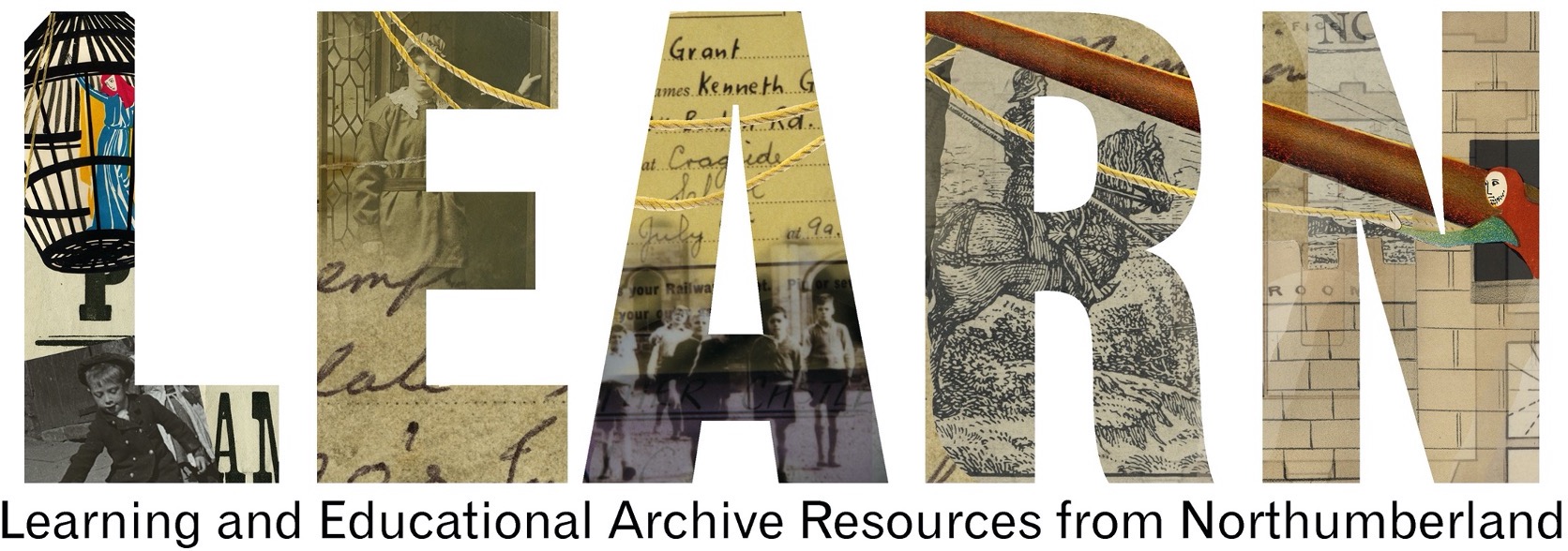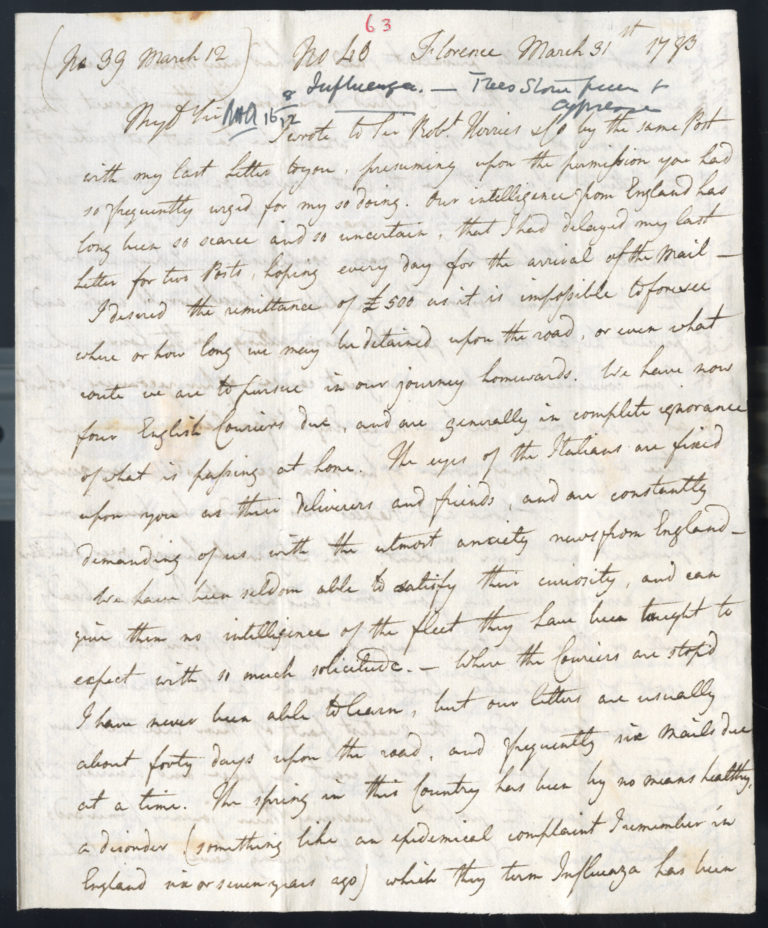Letter from John Carr to Ralph Carr about Conflict with France and Influenza in Italy, 1793
Reference: ZCE F/1/1/1/132
Topics: Medicine and Healthcare, French Revolutionary Wars, The Grand Tour
LETTER FROM JOHN CARR TO RALPH CARR
This letter is written by John Carr, brother of Harriet, to their father, Ralph Carr, from Florence, Italy, on 31 March 1793, towards the end of John and Harriet’s tour. Brother and sister had intended to leave for England in early 1792 but the outbreak of the Franco-Austrian War prevented this. John and Harriet returned to Florence in May 1792 staying there until November 1793.
It is clear from the letter that John is planning their journey home. In the second paragraph, he writes of requesting a ‘remittance of £500 as it is impossible to foresee where or how long we may be detained upon the road, or even what route we are to pursue in our journey homewards’. This sum was provided by his father, apparently via a London bank, Sir Robert Herries & Co. £500 was a substantial sum – equivalent to in the region of £77,000 today. This sum is likely to have taken the form of a letter of credit as the carrying of money was considered dangerous.
Uncertainty around the journey home was because of the political situation in Europe at this time. The French Revolutionary Wars (1792-1802), were a series of conflicts across Europe arising directly as a result of the French Revolution. European nations were shocked to learn of events in France and were fearful of the spread of revolution across the continent. A series of conflicts were fought in northern Italy between the French Revolutionary forces and a coalition of Austria, Russia, Piedmont-Sardinia, and a number of other Italian states. In this letter John states that the Italians are looking to Britain as ‘their deliverers and friends’ against French aggression. John offers an assurance to his father that he will keep abreast of news on French troops and regulate their movements accordingly when they set out for home. The letter demonstrates the perils of European travel at this time.
The letter also reports John and Harriet have had influenza which is also prevalent in Rome and Naples. This report must have been of concern to Ralph Carr. Harriet is known to have suffered from ill-health with a cough that we believe to have been tuberculosis – often referred to as consumption in this period. Sickness was another peril of the Grand Tour. The journey itself might result in travel sickness, illness might result from the food and drink consumed and there was always a risk of picking up an illness prevalent in the immediate geographical area. Medical attention might not be immediately available.
ADDITIONAL RESOURCES
(No 39 March 12) No 40 Florence March 31st 1793
My D[ea]r Sir
I wrote to Sir Rob[er]t Herries & Co by the same Post with my last Letter to you, presuming upon the permission you had so frequently urged for my so doing. Our intelligence from England has long been so scarce and so uncertain, that I had delayed my last Letter for two Posts, hoping every day for the arrival of the Mail.
I desired the remittance of £500 as it is impossible to foresee where or how long we may be detained upon the road, or even what route we are to pursue in our journey homewards. We have now four English Couriers due, and are generally in complete ignorance of what is passing at home. The eyes of the Italians are fixed upon you as their deliverers and friends, and are constantly demanding of us with the utmost anxiety news from England.
We have been seldom able to satisfy their curiosity, and can give them no intelligence of the fleet they have been taught to expect with so much solicitude. Where the Couriers are stop’d I have never been able to learn, but our letters are usually about forty days upon the road, and frequently six Mails due at a time. The spring in this Country has been by no means healthy, a disorder (something like an epidemical complaint I remember in England six or seven years ago) which they term Influenza has been almost universally prevalent, and has had very serious effects upon many people. I think I suffered more from it than Harriet, though I very soon got rid of the Cough, which she has not yet quite got the better of. I am not in the least troubled on this account as her coughing evidently is only the remains of the disorder, and not connected with her old pulmonary complaint. I keep her out in the air sometimes longer than perhaps she herself would wish, and prevent her as much as possible from sitting in the house, which I am convinced has been one great cause of her recovering so fast as she has done. We have many English families now here, and three or four young women of her own age are still very seriously indisposed. At Rome and Naples this disorder has been more prevalent and more violent. The holy week being over, travellers are arriving every day from Rome, and all the Inns are already full or their apartments engaged. Instead of going round by the coast of the Adriatic, Loreto, Ancona &c, as the English generally are accustomed to do, the greatest part of them will this year return to this place, in order to wait in peace and security, till they can have the prospect of pursuing their journey homewards without danger. Despairing of this, many have already taken up their quarters here, and have established themselves for the summer.
From our last accounts however affairs seem likely to take a more favourable turn, and I hope before the summer is well advanced that the road will be perfectly practicable. Friends or foes on this occasion are equally to be avoided by travellers, who cannot always answer for being upon the road in the sunshine alone, but if the French are driven back into their own limits the combined armies will naturally follow, and we shall be enabled to keep clear of them all. We will regulate our motions according to the b[e]st information we can procure, and take our measu[res] in all respects for the best, as far as common prudence can carry us. We will not forfeit the advantages of our
present situation till we are convinced that we can undertake our journey with effect, as we have no place to detain us except Venice for a few days in passing through, and as I know of no place from Wooler to Naples where Harriet could have the same reasons to wish to remain to the last moment. She cannot bear the thoughts of selling her horse and I have promised her that he shall not be disposed of ’till the last day. She has most undoubtedly acquired a great stock of constitutional strength, and her casual coughing is unattended by any pain or other symptoms that can give alarm. Your ever Dut[iful] Obed[ien]t Son John Carr
P.S. You shall hear again in a few posts. We have had a great deal of rain lately, and the spring is unusually backward. The leaves are only just out, which is three weeks later than the spring at Rome last year. I will collect as to trees, and particularly the kitchen garden whatever I can hope may prove useful, though the great difference of the climate I am afraid may disappoint us. This is not the Country for timber trees, save stonepine, cypresse.
Remittance – a sum of money sent in payment or as a gift.
French Revolution and French Revolutionary Wars
The Ancien Regime and the Revolution by Alexis de Tocqueville (translated by Gerald Bevan, Penguin Classics, 2008)
Interpreting the French Revolution by François Furet (Cambridge University Press, 1981)
The Wars of the French Revolution: 1792-1801 by Charles J. Esdaile (Routledge (2018)
Citizens: A Chronicle of the French Revolution by Simon Schama (Penguin, 2004)
Twelve Who Ruled: The Year of Terror in the French Revolution by R.R. Palmer (Princeton University Press, 2005)
New Regime: Transformations of the French Civic Order, 1789-1820s by Isser Woolrich (W.W. Norton and Company, 1995)
The Oxford History of the French Revolution by William Doyle (Oxford University Press, 2018)



